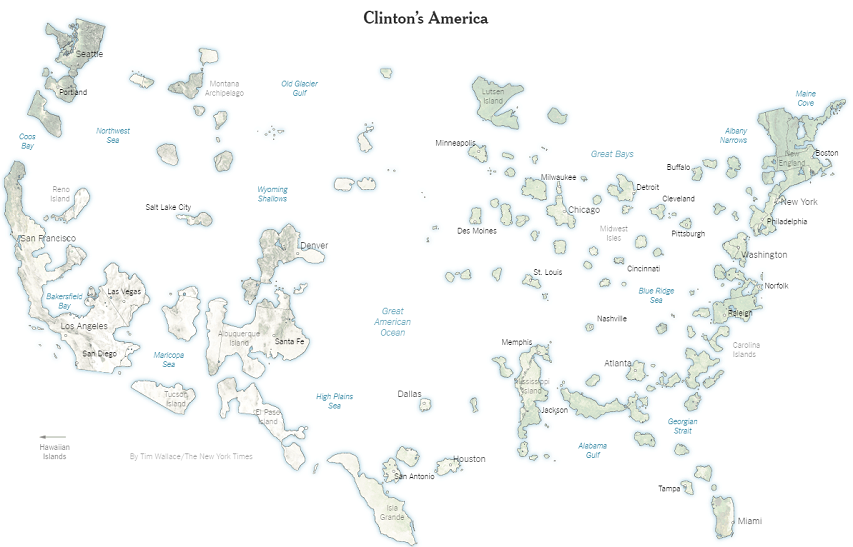Yet this is not solely a revolt of “values conservatives” against the brash, thrice-married vulgarian from Queens — a battle of Iowa against New York, as Cruz likes to frame it. There are other fault-lines. Neoconservatives such as Bill Kristol (or Robert Kagan, who says he will vote for Hillary Clinton) oppose Trump too, as do foreign policy realists such as Brent Scowcroft. Some of this is personal: Scowcroft and others feel a strong loyalty to the Bush family, whose animus toward Trump is incandescent thanks to the billionaire’s trashing of Jeb. But policy substance has also played its part in Trump’s improbable achievement: he has managed to turn many disparate Republican strands — Log Cabin types and evangelicals, neocons and Bush 41 stalwarts, Wall Streeters and military brass — against him. (That these different elements have not been able to cohere around an alternative candidate or program helps, in part, to explain Trump’s success, but it does not make their opposition any less real.)
Trade is a crucial example. The GOP has long been the party of free trade; in 1993, Bill Clinton could only pass NAFTA with Republican votes. But now its nominee denounces such trade as a destroyer of American jobs, apparently seeing commerce as something the US should do to, rather than with, other countries. The result was the astonishing sight of a Republican presidential nominee, in his acceptance speech, bidding for the voters of an avowed socialist, Bernie Sanders, “because,” as Trump put it, “we will fix his biggest issue, trade deals.” The issue was hardly debated in Cleveland, but the shift is remarkable all the same. Trump has refashioned the GOP as the party of protectionism, advocating an approach Republicans previously denounced as a threat to American prosperity.
Similarly, Republicans have for decades enjoyed an advantage on national security, obliging the Democrats to match them on strength and military commitment. Trump has broken from that too. He implies a rupture not only from the neocon, democracy-spreading policies associated with Bush the son, but also with the engaged internationalism of Bush the father. Trump is seemingly uninterested in America’s traditional status as sheet-anchor of the international system, central in a series of interlocking alliances that have maintained relative order and stability since 1945. Instead, he took time out from Cleveland to tell The New York Times he did not believe in the cardinal principle underpinning NATO — that an attack on one member is an attack on all — and that, as president, he would only defend one of the Baltic states from hypothetical Russian invasion if he deemed that state to have been paying its proper dues. Put aside the huge implications of such a shift for global security. Trump is turning his back on decades of Republican Party doctrine.
That’s true on the scale of government, too, with Trump implicitly advocating gargantuan powers for an imperial presidency: “I alone can fix this problem,” he says of crime, ISIS, immigration and much else. That’s quite a change for a party that has long regarded it as an article of faith that government is the problem and never the solution.
[…]
Republicans alarmed at these developments are not quite sure what will be worse: for Trump to lose or for Trump to win. Some have persuaded themselves that a Trump victory is best for America, simply because Hillary Clinton must not be president. (One Utah delegate, anguished about Trump’s “rough edges,” told me he believed Clinton was “evil.”)
But others are terrified by the possibility of a Trump victory. If that happens, they fear, the upheaval of 2016 will become permanent: the Republican Party will be reshaped in Trump’s image. It will be protectionist, nativist, authoritarian, and the vehicle for an exclusively white rage. Richard Tafel recoils so sharply from that prospect, he is talking seriously of forming a new party of the center-right. He’s already had conversations with “some of the wealthiest” CEOs and others, worried that Trumpism does not respect the prudent, cautious, free-market conservatism they value. For millennials especially, Tafel says, Trump is making the Republican Party a “toxic brand.”
The biggest challenge to forming a new political party is that the current system is completely rigged in favour of the two big parties to the extent that even long-established third parties like the Libertarians and the Greens still have to spend vastly disproportional efforts (and funds) just trying to get their candidates onto the ballot. A new “centre-right” party would face the same problem — and neither of the two big beneficiaries of the current system will be eager to see their institutional advantages eroded.




